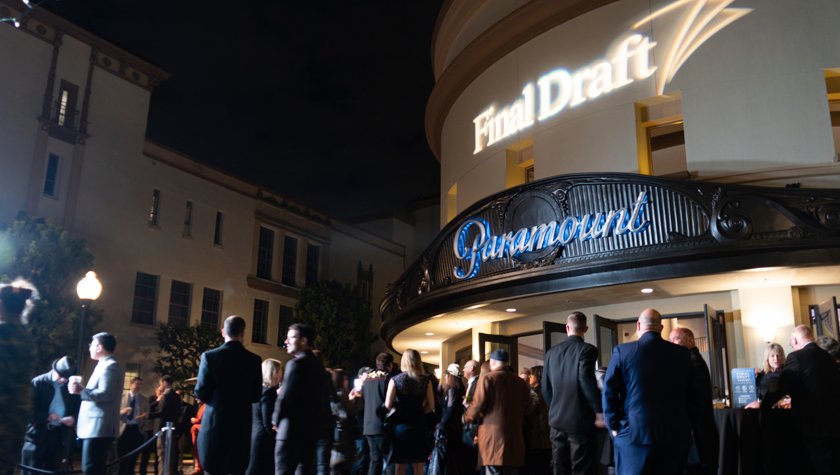From Concept to Congratulations: The Big Break Journey
March 25, 2020
Todd Goodlett has been “on cloud nine” since finding out that his original script, The Arsonist’s Handbook, was the TV Grand Prize Winner in the 2019 Big Break Screenwriting Contest — a feat, he says, he once never imagined, and that has already taken him to places of his wildest dreams.
The flight to cloud nine began in 2015 with a writing prompt from reality. Goodlett’s brother is a firefighter, and the writer became fascinated with arson investigation. While researching, Goodlett came across a story about a former arson investigator for the Glendale Fire Department, who was accused of starting over 2,000 fires between 1984 and 1991.
The story began to percolate in his head. The next step was putting pen to paper.
Writing a Winning Script
With just a few ideas, Goodlett began jotting down notes on index cards, which ultimately led to the story outline. Typically, an outline informs the first draft of the script. Yet when Goodlett started writing, he decided to take the story in an entirely new direction — uprooting his original narrative idea. Ultimately, he went back to square one.
“After I finished the first draft, I submitted the script to friends for feedback,” says Goodlett. “I wrote a new draft based on their notes, then I submitted the second draft to a different set of friends and just kept repeating that process over and over.”
“At some point, I used a paid story consultant, Jen Grisanti, who helped improve the overall structure of the story tremendously.”
The first draft took Goodlett about a month to write, but his revisions took much longer: he didn't have a final draft of The Arsonist’s Handbook until May 2019. Now the story centered on a female fire investigator whose hunt for a deadly serial arsonist in Los Angeles threatened to expose her unhealthy obsession with fire.
The Next Step: Big Break
But would other readers spark to the story as well? Goodlett decided to find out by submitting his script to the Big Break Screenwriting Contest.
“Big Break is one of those contests that I have on my calendar every year,” Goodlett admits. “It’s one of the most respected screenwriting contests in the industry. The exposure it provides for the winners and finalists is unparalleled.”
Goodlett hit the ‘Submit’ button, entering his script in the contest through Final Draft's online store. Enter Kala Guess, director of the Big Break Screenwriting Contest, who assigned the script to a reader.
“The script itself goes into a separate system that includes only the title and the script,” Guess says. “We need a blind read, so there is no writer information attached to the script.”

Guess, who has been directing the screenwriting contest for four years, says there are between 30 to 40 competition readers this year, industry veterans who have been vetted by the Final Draft team. The readers, who include writers, script analysts, and producers, are auditioned for their screenwriting competency and to ensure diversity behind the scenes. Readers are then assigned scripts based on their expertise and interests.
We want our readers and judges to reflect the voices that are missing from the industry,” Guess says. “That’s important to Final Draft, and it’s important to Big Break.”
Judgment Day(s)
A script must move through four rounds to succeed, each script going up against thousands of other entries. The Arsonist’s Handbook was one of approximately 8,000 scripts in the 2019 contest.
Each round, one person reads and scores the script, based on a point system. The reader then decides whether to advance it or not. They base their decision on multiple facets of the script, including story, character, originality, and execution. If the script makes it to the final round, two people will then read and evaluate it.
“Many scripts get knocked out in the first round because that's where we determine the scripts that… are not scripts,” Guess laughs.
“Round one is also a bit more lenient," Guess continues. "The readers are looking to see if the writer understands screenwriting, if the idea or concept is relevant or has legs. Round two and beyond, they are looking more closely at granular details like character, arc, and such.”
Once a script has made it to the fourth round, it's in consideration for the Top 3 of its respective category genre. In the end, there will be a total of 33 scripts that qualify as category winners.
An Early Holiday Present
For Goodlett, who entered The Arsonist’s Handbook in Big Break’s one-hour TV pilot drama category, discovering he made the Top 3 was exciting. But nothing could beat finding out he won that contest right before the 2019 holiday break.
“Kala sent me an email to let me know that I had won my category before the winter holidays, and it took a few hours for that to sink in,” Goodlett recalls.
After the announcement of the three category winners, Guess and three readers have what she calls a “throw-down phone call” to decide which of the Top 3 scripts in each genre category should win. After that decision is made, the winning scripts are sent to Final Draft’s judges, a select group of managers, agents, development execs, TV coordinators, and such. The judges decide who will win the top two grand prizes, one for television and the other for features.
“Kala called me to give me the good news that I had won the grand prize for TV. I believe my first reaction was, ‘Are you sure?’” Goodlett laughs. “You know, imposter syndrome kicking in. After that, it took a lot of restraint not to scream in her ear.”
The best part for many writers is that, throughout the contest, it feels like they are winning before they’ve even won. Guess will periodically send script loglines to industry professionals, and often those industry insiders want to meet a writer before the contest is over.
Once a writer advances to the Top 3 in their category, the advice, industry traction, and assistance from Final Draft and their connections only gets better.

“Final Draft introduced me to managers and helped set up meetings before the awards ceremony. They also put me in touch with Lee Jessup, an industry career consultant. She was so helpful and prepared me for meetings, as well as the awards speech,” Goodlett says.
A Guide Through Hollywood Waters
Lee Jessup is a screenwriting career coach who works with all Big Break finalists and winners. When a writer’s script wins a spot in the Top 3, part of their prize package includes advice and time with Jessup. She hosts a one-hour webinar for the finalists where she coaches them on general meetings, calls, and navigating the industry. Jessup’s primary goal is to help each writer learn how to capitalize on their placement. When a writer wins their category, Jessup provides one-on-one sessions with them to help them prepare even further.
In addition to the big awards ceremony itself, held in mid-January, Grand Prize Winners dine with a former Grand Prize Winner for tips on how to capitalize on their win. On the morning of the ceremony, the winners have breakfast with Pen Densham, a British-Canadian film television producer, writer, and director (Backdraft, Robin Hood: Prince of Thieves) who helps them prepare for their acceptance speech.
“The winners get on stage in front of 600 people and give a speech," Guess says. “Pen can ground them, center them, get them ready, and provide confidence to get up there."
Following the breakfast is a luncheon where the winners get to meet the judges who chose them.
The Big Night
In the evening, a limo picks the Grand Prize Winners up at their hotel and takes them to Paramount Studios, where they walk a real Hollywood red carpet (complete with interviews) with the other category winners, fellow writers, celebrities, and industry professionals. Winners then give their speeches at the Big Break ceremony, followed by a true Hollywood tradition: a cocktail reception.
This year's speeches were given in front of industry greats, including Lulu Wang (The Farewell), Steven Canals (Pose), and Quentin Tarantino—all of whom received honors for their accomplishments in the industry.
“It was a surreal experience. There were so many talented people in that audience, and I was so worried about my speech,” Goodlett says. “Normally, when you’re on stage speaking to a room of five hundred, you see the blur of an audience—but Tarantino was in the front row, and he has such an expressive face that I could see his reaction to everything I said. When he laughed at one of my jokes, the anxiety went away.”
After the Party, Work Begins
After all the glitz and glamour is over, it's time for business. Big Break helps its writers further their careers, such as Goodlett signing with agent Joel Millner at the Larchmont Literary agency.
“Since the contest, there’s been a flurry of meetings and so many people reading my script who would have never read it before. Final Draft set up lunches with very prominent people in the industry, such as [story editor] Christopher Lockhart,” Goodlett says.
With Goodlett on his way to success, the Big Break Screenwriting Contest is already gearing up for next year. They are hoping to crack 10,000 submissions, and to find the next screenwriting success story.
The Final Draft Big Break is open to submissions starting Wednesday, March 13, 2024, with over $80,000 in cash and prizes, as well as meetings with A-list executives.
Learn More about Entering the Big Break Screenwriting Contest!
Written by: Allison Norlian
Allison Norlian is a three-time, Emmy-nominated journalist who has worked as a television reporter and anchor in markets around the country. She has covered a variety of stories from the riots in Charlottesville, Virginia to President Trump’s travel ban in the fourth circuit court of appeals. Allison has also won AP awards for her work and a Catalyst For Change award from the Arc of Virginia for her reporting on the disabled community. Allison just moved to Los Angeles with her screen writer husband and two cats and is excited for all LA has to offer!



